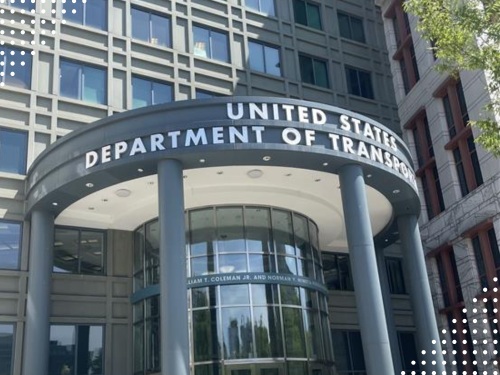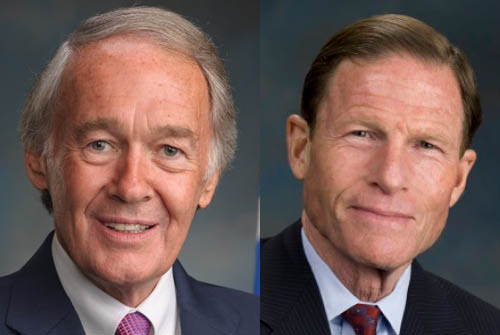Sen. Edward Markey, D-Mass., (above at left) and Sen. Richard Blumenthal, D-Conn., (above at right) reintroduced four bills on April 26 designed to improve automotive and traffic safety across the United States – bills they want included in an infrastructure funding package and surface transportation reauthorization legislation.

“Every year on average, over 36,000 people are killed and nearly three million more are injured in motor vehicle crashes,” noted Sen. Markey in a statement.
“These numbers reveal a public health crisis that we must not accept as inevitable. We can prevent these unnecessary tragedies with proven strategies and technologies,” he explained. “Upgrading our roads and highways also means upgrading safety.”
[Editor’s note: Patrick McKenna made a similar argument regarding the “public health crisis” aspect of motor vehicle crashes during his one-year tenure as the 2019-2020 president of the American Association of State Highway and Transportation Officials. AASHTO recently appointed McKenna, the executive director of the Missouri Department of Transportation, to a two-year term as chair of its Committee on Safety.]
“No less than roads and bridges, safer cars and drivers must be part of an infrastructure initiative,” added Sen. Blumenthal. “We must upgrade lagging auto recalls, deficient defect investigations, unsafe distracted driving, substandard seat backs, and other clear and present dangers.”
Those four bills are:
- The Promoting Auto Recalls Toward Safety or PARTS Act, which seeks to increase the speed and effectiveness of motor vehicle recalls. It would authorize the U.S. Department of Transportation to provide grants to states for use in notifying registered motor vehicle owners about manufacturer-issued safety recalls, as well as require additional reporting and an annual scorecard on how effectively automakers are completing any recalls.
- The Early Warning Reporting Systems Improvement Act mandates that automobile manufacturers provide more information about incidents involving fatalities and serious injuries directly to the public. It will also require the National Highway Traffic Safety Administration to make the information it receives publicly available in a user-friendly format so consumers and independent safety experts can evaluate potential safety defects themselves.
- The Stay Aware for Everyone or SAFE Act tackles the threat of distracted driving and would require the USDOT to study how driver-monitoring systems can prevent driver distraction, driver disengagement, automation complacency, and the foreseeable misuse of advanced driver-assist systems. The legislation also requires a rulemaking to mandate the installation of driver-monitoring systems based on the results of this study, incorporating appropriate privacy and data security safeguards.
- The Modernizing Seat Back Safety Act addresses motor vehicle seat failures during collisions, requiring NHTSA to update its standards for seat back integrity in new cars.
 Top Stories
Top Stories
USDOT Makes $1.5B Worth of BUILD Grants Available
December 19, 2025 Top Stories
Top Stories

